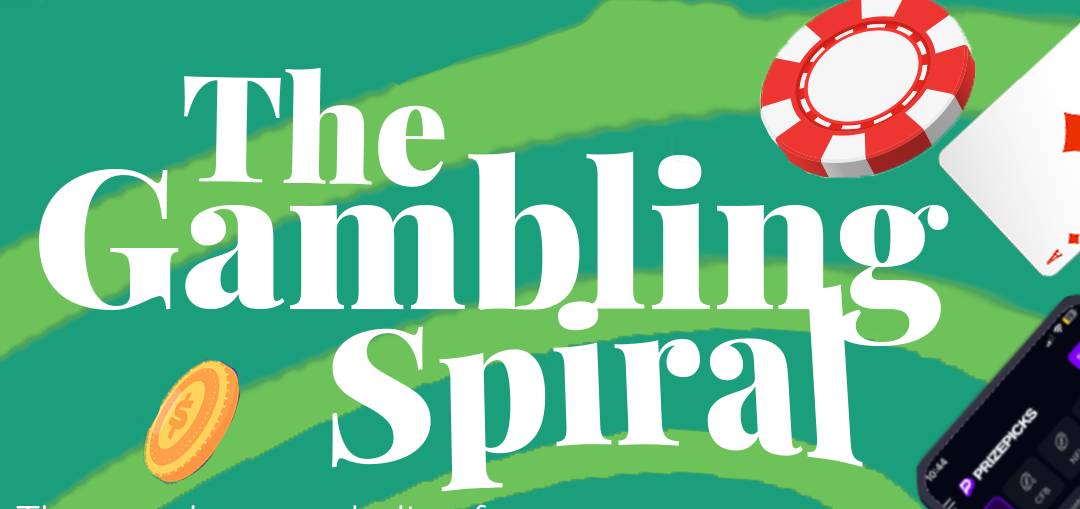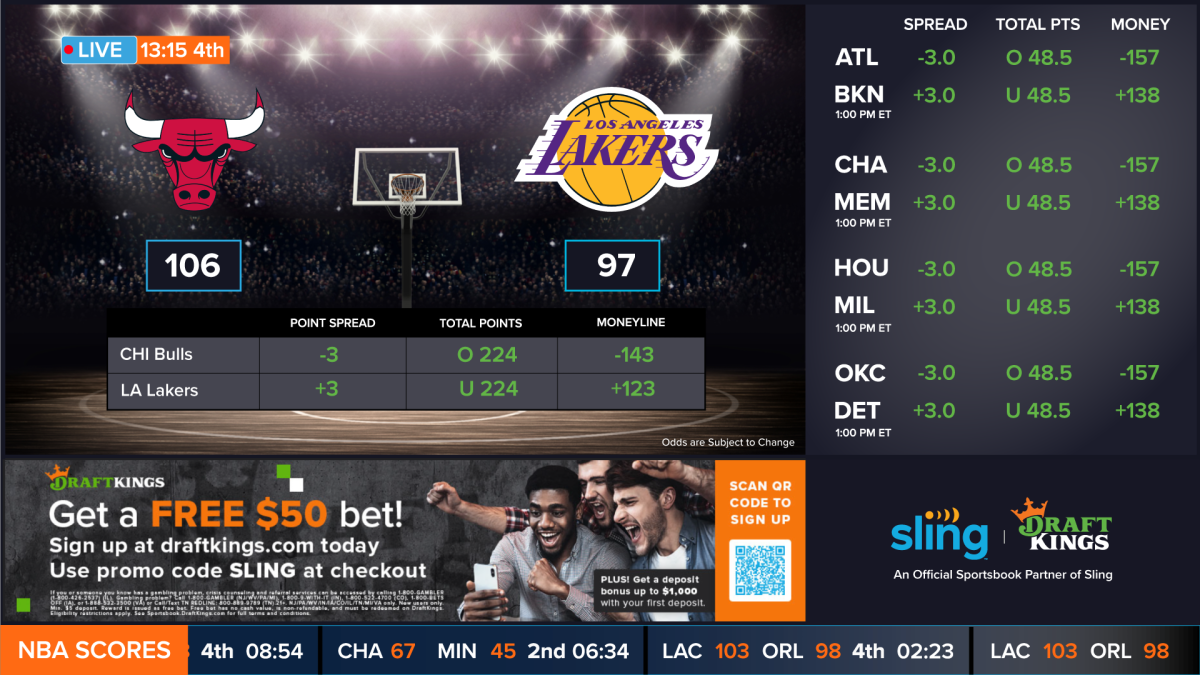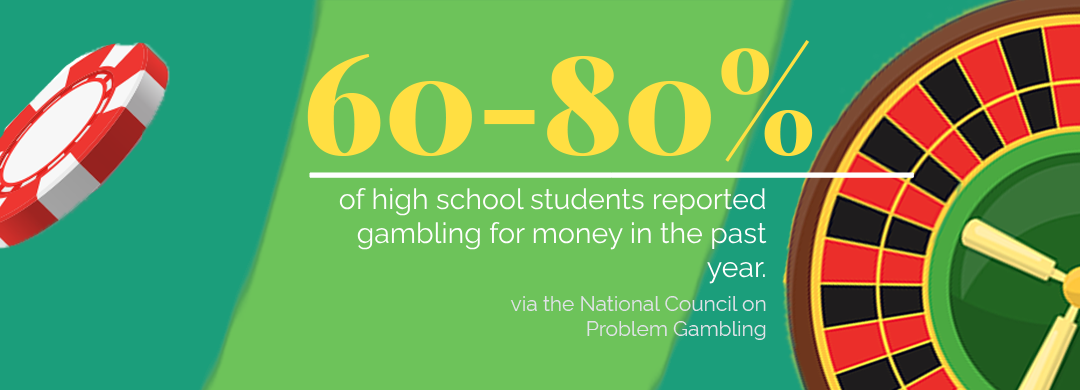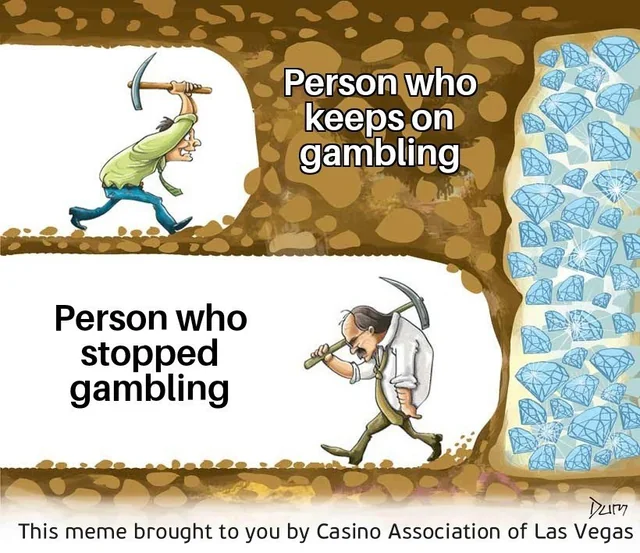
Teen Gambling
When you think of the most crippling addictions the teenage population suffers from, you would expect the main ones to be nicotine or alcohol. But there’s a new one sneaking up in the past couple of years, gaining an unexpected amount of traction: Gambling. According to a study done by Rutgers University, gambling in young adults has increased 400% since 2017.
Anonymous junior Aaron began participating in sports betting during football season in sophomore year with the apps Underdog Fantasy and Prize Picks, in which users can bet on player statistics and put together parlays, a single bet that combines two or more individual wagers.
“Sports betting adds a layer [of excitement] to watching sports. Sometimes when it’s a team you don’t care about, it’s hard to stay engaged,” Aaron said. “But knowing you have $5, maybe $10, on the line, because I’m not throwing in much more than that, it creates some suspense.”
Since getting a fake ID in July, originally to be able to purchase alcohol, he’s also gone to the casino on a couple of occasions with his friends to play blackjack. The closest casinos are no more than 20 minutes away, and the fake IDs have worked almost every time.
“Most of the [workers] don’t really care because as long as they can say you showed them identification, they can’t get charged with anything. You pay around $40 [for the IDs], and you get two copies. My friend went through the entire process to get them, and I basically just handed him the money and got my pictures taken at CVS,” Aaron said. “We’re also never winning over a couple hundred dollars, so [the casinos] don’t have any reason to get suspicious and recheck them once we’re in.”
As far as considering it an addiction, Aaron and his friends don’t gamble with enough money for it to “impact their day-to-day lives,” and consider it more of a fun pastime.
“I feel like there’s a lot of warning signs that you’re going overboard, but for me those signs don’t really apply because I don’t have to worry about crazy expenses like paying bills. I’m using money that’s gifted to me, money that’s expendable and that I’m not saving for a specific purpose. Although I know there is a possibility of losing money with gambling, that’s the same way there’s a possibility of winning and success¹,” Aaron said. “I do it because I’m spending time with my friends and for the thrill, every payout is a little bit of an adrenaline boost.”
Anonymous senior John also justifies the money being spent on sports betting saying it would be used on “random stuff” anyway, which seems to be a common mindset amongst teenagers that have the privilege of extra pocket money.
“I don’t think [betting] is a bad thing because I’m using my own money and my dad supports it,” John said. “To him, there’s no difference between sports betting and spending money on video games. It’s just tradeoffs.”
Anonymous junior Blake has a more focused participation in gambling, strictly playing card games with his friends and the occasional video game bet. According to Blake, in certain video games, people can pay money for the chance to obtain rare skins that can then be sold for up thousands of dollars, on the off chance that the skins are actually won.
“I started [playing cards] as a freshman when the seniors on my team invited me to play without teaching me, and I lost $20,” Blake said. “I went back the next night, chasing that money, and I’ve been playing with my teammates and improving ever since, and through experience I’ve found out that I’m relatively decent at it, and it’s something I beat my friends in.”
Blake and his group of friends mainly play poker and Blackjack, usually betting around $10 or $20, or occasionally having high stakes nights where players ante up to $100.
“It’s honestly a really fun time. Everyone’s having fun, especially when there’s stakes involved. It’s not [extreme] stakes where anybody’s leaving crying. If anything, you leave and think, ‘Man, that sucks,’ but it’s still a fun time. Everything’s a lot more fun when you’re put in a little stressful situation. You look across the table and your friend is freaking out that he’s down $3,” Blake said.
There’s a difference between betting and playing card games. Blake acknowledges the unhealthy aspects of playing with money at stake, and the importance of being responsible and knowing when to bow out.
“I would say that if you’re going to gamble, don’t take it too seriously and to never bet on things you can’t directly control, like horse racing or sports betting. Playing card games gives you more of an opportunity to have a role in what happens to your money,” Blake said. “Sometimes my friends and I play games based on chance with really low stakes, say we flip a coin and bet a dollar on the outcome. It can get intense when it’s all luck, you can see people getting pretty frenzied, even when the stakes are so low.”
Psychiatrist Sarah Harper connects the potential for poor decision making of teenagers with the development of the myelin sheath around the axons of neurons not ending until a person’s mid-twenties. These undeveloped neurons affect teenager’s decision making.
“It’s harder to anticipate the consequences of your actions with your neurons still developing, so it’s easier to make the sorts of choices that could lead you to addiction,” Harper said. “You’re more impulsive and more likely to succumb to peer pressure.”
Exposure to social media and witnessing peers participate in gambling plays a large role in any sort of addiction developing in kids and adults because it becomes normalized, according to Harper. Gambling especially isn’t discussed as often as certain street drugs; therefore, kids don’t understand the possible consequences.
“Some people have a predisposition to [addiction]. So once that door is opened, they can struggle in a way that someone else wouldn’t. Peer pressure opens that door for addiction,” Harper said. “What happens with addiction to gambling is your brain secretes dopamine, and then as you start building up that tolerance, you need to spend more and more to get that same dopamine hit.”
Addiction is what causes people to continue gambling when they’ve lost a considerable amount, why alcoholics drink as they’re awaiting a liver transplant even though that makes them ineligible, and why people in the hospital hooked up to an oxygen tank still smoke cigarettes.
“It’s the same thing as saying, ‘Well, I’m only having a few drinks to take the edge off.’ The online aspect of [gambling] makes everything so much easier for kids, too, because you can lie about your age like never before,” Harper said.
While it’s possible to gamble without addiction or extreme money loss, that healthy perfect balance is something very few people can maintain without risking the slip into addiction. For most, the dopamine rush is too good to refuse.
“Some people can try any kind of drug and never become addicted, and some people have naturally addictive personalities. But addiction can develop very easily, especially when you’re a teenager. Until your brain is done developing, the risk is much higher,” Harper said.
Harper encourages kids struggling with any form of addiction to seek help, acknowledging the stigma surrounding addiction and how difficult it is to admit that one has a problem.
“Any therapist or any psychiatrist or your school counselor can help you out. If it gets to a point where you’ve lost all your money or you’re stealing from your parents and lying about your age, you won’t be able to keep it a secret anymore,” Harper said. “I think there’s a lot of shame involved in seeking help, and it’s something that absolutely should be destigmatized.”
¹Editor’s Note: Contrary to Aaron’s perspective, the Queensland Government reported that the real odds of winning the top prize in a poker machine are as low as 1 in 7,000,000, refuting the assumption that there is a considerable probability of winning.
The app prompted him to prove he was 21; he scanned his father’s ID and illegally created a betting account under his name. This scenario is common as the rise of online wagering becomes a source of income and entertainment for adolescent sports fans but guises the risk of addiction and fiscal commitment.
Anonymous senior John hoped to make “twenty bucks here and there” using his football knowledge, so he began betting on individual players through the app Underdog Fantasy at the start of this NFL season. Initially motivated by his love for the sport, he soon realized the allure of sports betting.
“I feel like I’ve stopped watching [football] in the last few years, but [betting] has enticed me to watch it more because I have stakes in it,” John said.
Upon adding money to the equation, the connection that sports gamblers feel to games and players grows but not always for the best. The National Collegiate Athletics Association found that one in three high-profile athletes receive abusive messages from someone with a betting interest. An obsession with player performance and statistics can negatively impact the emotional wellness of the athlete and the gambler.
“There was one bet that I placed and a player got hurt, so I didn’t make as much money, and I was in a horrible mood for the rest of the day,” John said.
Although John is employed, he claims income motivates many unemployed high schoolers who believe their knowledge of sports can unlock monetary success.
For anonymous junior Luke, earning money was his primary goal, but with two sports taking up most of his time, attaining a stable job proved difficult. Instead, he began using Underdog Fantasy a year ago, spending his money saved from good grades, birthdays and allowances to bet on the MLB, the NFL and college football. With his income relying on the uncertainty of gambling, though, Luke’s enjoyment of watching sports decreased from before he began betting. Wagering was initially an avenue of entertainment and motivation to cheer for certain teams and players, but it has proven to be a source of upset and frustration.
“I didn’t like [watching sports] anymore, and I felt like it was draining me because when something I bet on didn’t make money, I would [feel] down,” Luke said. “I couldn’t enjoy sports without getting mad at the players.”
With disappointment in previous bets and losses, Luke took an eight-month break from Underdog Fantasy, but when reminded of it by his friends’ participation, he redownloaded the app. The influence was hard to avoid; the National Council on Problem Gambling reported that 60-80% of high school students reported gambling for money in the past year, thus proving its presence in adolescent culture.
“When I quit, I didn’t think much of it, but when my friends started coming around me and talking about their bets, that got me back into it,” Luke said. “I felt like I was missing out.”
Alex experienced something similar; following losses and discouraging results, the urge to quit is strong but short-lived.
“When I lose, I say, ‘I’m never doing this again,’ and then the next day I’m just like, ‘Okay let’s go bet again. I’m going to win. I’m due for a win,’” Alex said.
The fault does not lie entirely with the users, though, as some pressures to continue gambling are rooted in peer influence, but mostly app “inducements.” These include algorithms and AI-personalized push notifications offering doubled deposits, deposit matches, bonus bets and promo codes, all of which Alex describes as methods to “drag people into gambling.”
For example, if an algorithm detects a user is likely to quit after a string of losses, the app will offer a “risk-free bet,” where they can get their money back if the bet doesn’t hit. But, in the fine print, they explain that the user cannot withdraw that money and must bet it again, risks attached.
“The pressure [to gamble] isn’t from people around me. It’s the promotions that the apps have given out,” Alex said. “It’s played a big role [in my wagering] because it makes me think it’s so easy with the free bets.”
The American Gaming Association estimated that Americans spend $150 billion on wagers annually, most illegally. Despite these questionable practices, Daily Fantasy Sports (DFS) apps remain legal because they are considered skills-based and users bet on multiple players, unlike illegal gambling where users bet on single teams or players. DFS such as FanDuel and DraftKings are invested in by sports leagues and media, so they are heavily promoted, especially to males aged 18-35, according to the Fantasy Sports and Gaming Association.
John says he sees ads for DFS “all the time.” In 2023, gambling ads were aired 60,000 times on TV, and the industry is expected to spend 1.3 billion dollars in advertising in 2024. He doesn’t think the ads prompted his participation, but rather enforced what his friends were promoting and made it easier for him to make an account. The star-studded ads featuring celebrities such as Kevin Hart and Lebron James have brought attention to DFS, attracting a population of sports fans, especially young ones. The ads simplify the process of placing bets and feature “limited-time deals” to encourage new users.
“Considering that I’m underage, and I’m getting those ads on my feed, I definitely think they’re targeting younger audiences and banking on underage kids to spend their money,” John said.
Young gamblers often deposit small amounts to reduce the risk and prevent major loss, according to Alex, but the small amounts can accumulate into larger losses. The same National Council on Problem Gambling report previously mentioned also found that 4%-6% of high school gamblers are at risk of developing a gambling problem.
“People keep losing this money, and they keep depositing, and over time, it’s just building up,” Alex said. “You don’t realize how much money you’re actually losing.”
The set up of DFS, its casual advertisement, and quick in-game parlays they sell users makes sports betting feel like a game and makes users value their money less, according to Alex.
“At the start of gambling, I valued my money more, so I would look at statistics,” Alex said. “But once I started losing and winning so much, my attention to strategy died off.”
Alex still treated sports betting as a game when he started spending actual money because of his previous experience with fantasy apps.
“Before I got Underdog, I used this app called Fliff, which was fake money, but I didn’t really care for it,” Alex said. “I would just put bets in and come back in the next two days to see if I won. I kind of forgot about it.”
Most parents are not involved with their children’s gambling pursuits and are often unaware of their children using their IDs for accounts made under their names. Yet, students still use money provided by their parents to fund their activities.
Should parents play a greater role in restricting adolescent access to gambling platforms?
Sorry, there was an error loading this poll.
“I know it’s selfish to risk my parents’ money on something that’s not right,” Alex said. “But I do it because I want to be entertained, and I don’t see myself backing out of it anymore. It’s something that I must have.”
The gambling lobby in the U.S. has only grown since president George W. Bush’s ban in 2006, and it doesn’t seem to be slowing down. In total, Americans wagered almost $120 billion on legal sportsbooks last year, up from $93 billion in 2022, according to CNBC. Gambling has become a significant component of U.S. law, intersecting with legal, political, and economic dimensions, which was largely spurred by legislation that legalized fantasy sports betting. Companies such as DraftKings and FanDuel have built a powerful corridor between the industry in politics, allowing them to control the legality of the business and boost profit.
In 2006, President George W. Bush signed the Security and Accountability for Every Port Act (seen in full below) which included Section 803 addressing internet gambling in or through foreign jurisdictions. This law aimed to curb online gambling activities by banning gambling companies from taking money by means of the internet, effectively outlawing online poker and other forms of online gaming. It was a significant moment in U.S. gambling law, aiming to bring regulation to the rapidly expanding online gambling world. However, the law left a notable exception: fantasy sports betting.
Under a lower clause, the legislation stated that betting did not include “any fantasy or simulated sports game or educational game or contest if the game or contest involved a team or was based on skill, not chance.” This distinction paved the way for platforms like FanDuel and DraftKings to flourish.
Fantasy sports betting, once viewed primarily as a means for bragging rights rather than financial gain, began to challenge the legal boundaries set by the 2006 law. Platforms like FanDuel and DraftKings began to offer daily fantasy games, which included tournaments and cash games, attracting a substantial user base. These platforms benefited from major advertising campaigns, promoting the idea that with “one good day’” of picks, a player could win thousands of dollars. Although fantasy sports operated within the legal framework, it began to resemble traditional sports betting more closely. In the eyes of many experts, FanDuel and DraftKings blurred the lines between fantasy sports and sports gambling.
At the same time, insider betting scandals—particularly in the NBA—brought more attention to the growing issue of sports gambling in the U.S. [When] the NBA claimed that sports betting should be legalized because it increased fan engagement. This viewpoint resonated with many lawmakers who saw potential economic benefits, such as tax revenue that could support state economies. In [this year], approximately $150 billion dollars were wagered annually on sports in the U.S., with only a fraction being placed legally. Given the sheer size of the black market for sports betting, many advocates began questioning the effectiveness of the gambling ban.
In 2018, the question of the federal ban on sports gambling reached the U.S. Supreme Court where Associate Justice Samuel Alito ruled that banning sports betting was unconstitutional, leaving the decision up to individual states. Following this ruling, eight states immediately legalized sports betting, with an additional 10 states doing so by 2019.
Tribal casinos also started expanding into the market and DraftKings opened lounges across the U.S., with the rise of mobile online betting accelerating the industry’s growth. Lobbyists actively promoted sports betting as a source of significant tax revenue, arguing that it was better to legalize and regulate the activity, as people were already betting illegally. This mirrored an effort by sports companies to appear omnipresent in the sports industry, so it would require a serious cultural change to make them illegal. By 2022, 30 U.S. states and Washington, D.C. had some form of legal sports betting, offering bets on everything from half time outcomes to player statistics.
The onset of the COVID-19 pandemic created a new normal for the sports betting industry. As sports seasons restarted, betting platforms capitalized on the situation, spending three times more on TV advertising and prominently displaying their logos at major sports events. Partnerships with universities like Louisiana State University, Michigan University and University of Colorado Boulder were established, where platforms directly marketed to male students aged 18 to 35, offering inducements to get them involved in betting. The gambling industry worked to make betting seem natural and essential to the sports-watching experience, like wearing a team jersey for the big game.
However, the U.S. is not the only nation affected by the rise of sports gambling. In fact, our gambling industry pales in comparison to Australia’s industry. While the U.S. was embracing online sports betting, Australia was already a nation of gamblers.
Australians lose more money per capita on gambling than any other country, a statistic fueled by the country’s more accessible casinos, which are often located within city centers, unlike in the U.S., where casinos are typically destination venues located outside urban areas. However, a combination of the Bush ban loophole, the Supreme Court decision, and the omnipresence of sports betting companies have created a safe haven for the gambling industry in the American legal system. This situation allows individuals to risk their homes, savings and livelihoods while some communities have become financially dependent on the industry.
Tribal casinos have been legal since 1988 as a way to sector a portion of the state’s economy to revitalize Native American communities. Nonetheless, lawmakers understand that sports betters and casino-goers are playing a losing game. Despite this reality, the industry’s profitability, paired with political lobbying and industry donations, is slowly creating a nation of gamblers.







